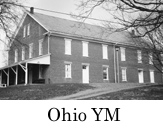The following is the entirety of the memorial (with the exception of some introductory material regarding North Carolina Friends).
Among those who sought to build up new homes from the unbroken wilderness of eastern Ohio were Silas and Rachel Patterson, who came to Belmont County in 1808. The parents of Silas had come from England, and Rachel came from the Nantucket stock of Starbucks. Silas died in 1826, leaving his widow with five small children to contend with the privations of pioneer life. The oldest, a daughter, a cripple, there were two sons, a daughter Mary who died young, and Asenath, the subject of this sketch, who was born in 1820. (The struggle was a severe one, yet doubtless it was all for some good purpose. It was the same old story repeated so often in pioneer days of a widow left to rear a family of children, and succeeding so well that some of our most noted men have come from just such homes.)
Asenath Bailey, to quote her own language, was of a wild and thoughtless disposition during her girlhood days, "yet even then there was a silent voice within that told me that I would have to speak for my Master's cause some time.” She was an expert at horseback riding, and had at different times taxed the speed of her horse to the utmost to leave behind young men trying to ride with her. She might be said to come honestly by this ability, since her grandmother Elizabeth Patterson, a minister in the Society of Friends, had travelled in the service on horseback all the way from Belmont Co. to North Carolina. It was no uncommon sight in later life to see Asenath Bailey coming to meeting or town on horseback, even after travelling in that way had almost gone out of date for women in that neighborhood. Though in her latter years she seldom referred to them, many were her girlish pranks in those days, and all through her life she was of a lively disposition and interesting in conversation. She was deprived of an education, as in her days there were no free schools, and few of any kind, so that her widowed mother had no opportunity to educate her children, and it was only by constant exertion and economy that she was enabled to provide for the necessary wants of herself and family. Asenath learned to read and write. This was the extent of her education. In later years she was a great reader of the Bible. This and direct inspiration from her Master made her a leader in Christian thought, seemingly always ready with scripture quotations, defining the duty of Men and the source of all true blessings.
She was married to Jesse Bailey in 1837, being then only seventeen. It may be called an early marriage, but that was common in those days in the Society of Friends as well as elsewhere and probably caused no comment. There was not much cause for objection; the wants of a family were few and with industry, were easily supplied; each of the partners felt a share in building up the home, and it seemed easier for them to grow into one another's lives. Later on when more was needed to provide for the needs of a home, and when comforts and luxuries became the order of the day, they could not be called extravagances, yet required considerable money to supply them. This tended to produce a change in the attitude of society towards marriage, so that early marriages around Philadelphia at least, were hardly looked upon with tolerance among Friends. It was a current saying there at that time, that a young man could hardly expect to be married until he was worth fifteen thousand dollars. A ministering Friend making a religious visit through Ohio and Iowa in 1880, met a young couple of 22 and 20, and was almost shocked on learning that they had assumed the marriage relation without any settled business in prospect. A variety of contributing circumstances made this marriage a successful one. The minister had never been married, and this might have had some effect in influencing her sense of impropriety, but she took occasion to ask the parents of the bride if they really considered it a religious duty to have their children marry so young. Time has modified the feeling all over the society, so that a much nearer approach to the golden mean exists all over than formerly.
To return to Jesse and Asenath Bailey, they went to housekeeping in a very primitive way on a farm in Somerset township, where they lived six months, then Jesse's mother dying, they went to his father's to keep house for him on the farm now owned by their grandson, Ross Bailey, two miles east of Barnesville. Here their three older children were born. Then they located on Asenath's mother's farm, since known as the Bailey homestead four miles southeast of town. It is a beautiful spot though in an isolated situation. Low down in the valley with a purling brook near the house, the delight of their children and grandchildren. It is still owned by their only surviving child, Allen Bailey, but the Goshen road, by which it is reached, has now become so impossible in these days of improved highways, that none of the descendants care to occupy the farm and it is rented out to strangers.] Four more children Lindley, Allen, Rachel and Mary were added in this home, but the last two died in infancy and an older daughter in her 21st year. Asenath met her motherly trials with a prayerful concern for the welfare of her children. Her son says that her devotion to her family and what seemed to her to be her duty as a mother and a wife in providing for the wants of her children was seldom if ever exceeded by any. The student of sociology would probably find few places more fully representative of the life of the second period of Ohio Quakerism, than in this family. (The hardships of the pioneer days were past but there was lots of hard work, and lots of those homely comforts and that hospitality which so largely characterized Friends throughout the 19th century in Ohio. The social life was free and easy, and could hardly be said to be conventional, coming and going when they pleased, while the mother endeavored to exercise a religious care over the children.) They were three miles from meeting and the road bad most of the year, but unless prevented by sickness, Jesse and Asenath Bailey planned regularly to attend at Stillwater. During 1881, when the infirmities of age called for a relief from the active affairs of life on the farm, they moved to a small home on the hill east of the meeting house. Here they kept a horse and cow, and passed many happy days together; and here they experienced that rest they had never known before, enjoying the visits of their friends and were free to visit them in return.
Asenath Bailey was recommended as a minister in 1860 [ed. note: the meeting minutes say 1871], when she was forty years old; she often felt that she had to go down to the bottom of Jordan and bring up stones of memorial. It was a great cross to her natural mind, to give up to the pleadings and warnings of her Master, feeling that she was so deficient. Many times the saying of David came to her, “How can I be the son-in-law of the King?" She felt her nothingness, her lack of knowledge of the things of this world; yet she says, “when I did give up to speak in public, the peace of mind it brought surpassed all understanding, and thus was I encouraged to press on." She was often liberated by minute to visit in the love of the Gospel other meetings, families and penal institutions though it is probable that her field of labor was more closely confined to the state of Ohio than that of some other ministers, and was conspicuous in the neighborhood where she lived. Her mind seemed particularly drawn toward those who had violated the laws of God and man and in this relation she asked for and received minutes to visit the Ohio penitentiary, and also the one at Anamosa, Iowa, in each pleading with the inmates to live better lives, we trust to the tendering of some at their hearts. Her chief desire seemed to be toward the afflicted and wrong doers of all classes, her advice and ministry to such being timely and direct, offending none, but striving for the advancement of their best interests.
Hers was not a ministry of smooth phrases and studied rounded sentences, but an inspiration given her from her Lord and Master at the time "who is a discerner of the thoughts and intents of the heart, sharper than any two edged sword." Gifted with a strong voice and distinct articulation, her earnestness drew the attention of her bearers to the voice of God speaking through her. She was an exemplification of the contention always made by Friends that it does not take human learning to make a Gospel minister.
In company with her friend Elizabeth Smith of the same meeting, Asenath attended Philadelphia Yearly Meeting in 1880. As they had but little to communicate, our late friend Joseph S. Elkinton expressed that he did not know but they were sent there to teach Philadelphia Friends how to be silent.
In the course of the visit to Hickory Grove Quarterly Meeting, to which the reference was made heretofore, in connection with the Iowa Penitentiary, she was present at Springville Monthly Meeting, and impressively engaged in a sermon from the text “The ways of Zion do mourn because so few come to her solemn feasts." So few are disposed to become active servants of Christ, and partake of the rewards accompanying it.
The welfare of the children was a subject near and dear to her and she was concerned to press upon the parents their responsibility towards them, at different times. The summing up of her life was fittingly expressed in a sermon by herself near the end, from the text "Surely goodness and mercy have followed me all the days of my life." This was spoken at the last Yearly Meeting before her death, and can we but hope that the remainder of text may be verified in her case, "and I shall dwell in the house of the Lord forever.”
Having been confined to her bed for seven weeks, on first day, Eleventh Month 26th, she seemed to be sinking. Being told that the doctor thought her time on earth was short, she said she hoped soon to be released if it was her Master's will. Calling her three sons to her bedside, she said, "I hope you will always live godly lives, so that I can meet you in heaven, as I shall certainly go there. Be good to-everybody no difference what they do to you." Saying, "with my many mistakes, my Heavenly Father has been very gracious to me." After dinner her children being at her bedside, she said “I hope this will be the last meal you will eat while your mother is living. You are all here now and I want to kiss you all." Then advising each one to do right so as to be a good example to their children, and not be taken up with the pride and vanity of this world she added, do not object to historical and other useful reading, but hope all will read more religious works."
Again she said to her three sons, "never allow an angry word to pass your lips. I have not allowed an angry word to pass my lips for a long time. I have had many trials; have had to speak my Master's will when it was very humiliating, but the Lord has given me great peace of mind when I obeyed him." To her niece the said "thee has been very kind to me; put thy trust in the Lord and he will care for thee always. Look to him and there will be a way for thee." It may be added in passing that this niece had become an inmate of their family under very unusual circumstances. Near the middle of the century there was very much excitement in the public mind, and no small amount of ill will directed against the order of the Masons and George Patterson being in some way involved had disappeared, and never was heard from afterwards. His little daughter, being thus left without a caretaker, was taken by Jesse and Asenath Bailey, becoming a daughter to them in the place of their own three daughters who had been early taken away by death, and the mainstay to them in their home in old age. Jesse Bailey like his wife was of a very benevolent disposition and too kind to turn away anyone in need, so Mary Patterson was not the only one who had been thus befriended.
Returning to the deathbed scene, two nephews and a niece also coming in, she said (calling each by name) she hoped they would put their trust in God, and be good examples to their children. During her eight weeks of confinement to her bed, she was never heard to speak a complaining or impatient word, saying many times, "Oh my Heavenly Father, when consistent with thy holy will, please release me," being thus a living example of Christian faith.
During all her sickness, her concern seemed to be for others to see that their lamps were trimmed and burning and ready when the bridegroom came, realizing that her work was done in the daytime and her house in order, lo these many years. She lingered, gradually growing weaker until 4th day morning Eleventh Month 29th, 1906, when her spirit took its flight to dwell for all time with its Redeemer. (At no time did she suffer much, her mind was clear to the close and she peacefully passed away without a struggle. Oh Death! Where is thy sting? Oh grave there is thy victory?)
Her body was consigned to the earth in Stillwater burying ground, by the side of her husband who preceded her in 1898. The last respects paid her body in the meeting house were attended by a large company, among whom were six ministers of the Society, all appearing in vocal ministry or prayer, baptizing all with that spirit which leads the Christian to cry out, “The Lord is my shepherd, I shall not want,” and the believer to say, “Oh my heart be still, and know that I am God; I will be exalted among the heathen; I will be exalted in the earth.” The voice of Asenath Bailey is forever hushed, but her influence and example will long be felt among us.
In conclusion we might add that she was very fond of poetry, and had she cultivated her taste for it, she. might have become something of a poet. It was easy for her to construct rhymes in her younger years, and she had committed a great many poems which she used to like to say over to the children during her last sickness. One night, shortly before her death, she repeated the lines supposed to have been written by Alexander Selkirk on the island of Juan Fernandez, beginning 'Oh solitude where are the charms that sages have seen in thy face.’ Those who were caring for her that night thought that she went over the whole poem distinctly. She was fond of historical works, and in later years with the return of second sight, she read many books of this character. Not long before her last sickness, she read Macauley’s History of England, perhaps completing the whole of it, but at no time did she neglect the Bible.
Asenath was very much interested in trying to help the poor and needy. She has been known to ride several miles, on horseback with a well filled basket to give some families relief whom she had heard were needing help. She was always ready with a reply to questions put to her, and sometimes very apt. Often ministers of other denominations called to talk with her, and she seemed to be able to meet them. At a certain trial she was called as witness where a good for nothing fellow was endeavoring to extort some money from some relatives who he claimed owed him for labor performed, and when the opposing lawyer put the question, "Well now Mrs. Bailey what work did you see this man do?" Her answer was ready. 'I don't know that I ever saw him do much of anything.' So the impression is left that she was as shrewd in matters of worldly import, as she was earnest and concerned in those of the heavenly kingdom.
|






